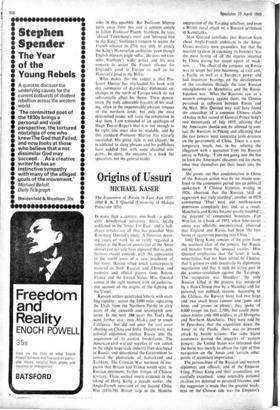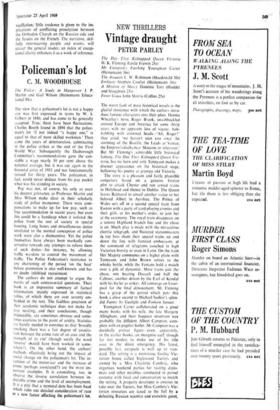Origins of Ussuri
MICHAEL KASER
In more than a century, one book=a politi- cally bowdlerised university thesis, locally published in the Soviet Far East—and a half- dozen articles are all that has preceded Miss Rosemary Quested's study. A historian devot- ing years of work to so rarely regarded a subject as the Russian annexation of the Amur district can scarcely have expected that its pub- lication should coincide with the appearance in the world press of a new instalment of her story. Having sifted much contemporary material in both Russian and Chinese and memoirs and official papers from Britain, France and the United States, Miss Quested comes at the right moment with an authorita- tive account of the origins of the fighting on the Ussuri.
Russian settlers penetrated Siberia with start- ling rapidity : across the 3,000 miles separating the Urals from the Northern Pacific in sixty years of the sixteenth and seventeenth cen- turies. In the next 260 years the Tsar's flag went farther east—into Alaska and to touch California—but did not enter the vast areas abutting on China and India. Distant wars, not colonial expansion, pushed Russia into the acquisition of its eastern borderlands. The American civil war cut supplies of raw cotton to the single large-scale industry then developed in Russia, and determined the Government to control the plantations of Samarkand and Tashkent. The Crimean War nurtured its sus- picion that Britain and France would seize, to Russian detriment, further fringes of Chinese territory. There seemed ample evidence in the taking of Hong Kong a decade earlier, the ,Anglo-French incursion of the Second China War (1856-58), British help in the Manchu suppression of the Tai-ping rebellion, and even a British naval attack on a Russian settlement in Kamchatka.
Miss Quested concludes that Russian fears about Anglo-French ambitions in the Amur- Ussuri territory were groundless, but that the reaction to them in extending its frontiers 'was the most lasting of all the injuries incurred by China during her recent epoch of weak- ness. . . . The effect of the conquest on Russia was to tempt her into becoming, at -vast cost, a Pacific as well as a European power* and had important bearings on the development of the revolution through the later Russian entanglements in Manchuria and the Russo- Japanese war.' What the Russians saw as a western conspiracy against them, the Chinese perceived as collusion between Russia and the West. Miss Quested may well have found the antecedent of a common Chinese claim of today in her record of General Prince Seng's two memoranda of July 1859, advising that the Americans should not be allowed to con- tact the Russians in Peking and affirming that the two powers were exercising joint pressure on the government of China. There is a con- temporary touch, too, in her refuting the allegation with a quotation from the Russian envoy in Peking: 'I am not going into the fire to fetch the Americans' chestnuts out for them, since they themselves put their heads into the noose.'
She points out that condemnation in China of the Russian action was by no means -con- fined to the communist period nor to political spokesmen. A Chinese historian, writing in 1926, observed that the Russian 'skill in aggression was truly startling'; another in 1929 commented 'Thus were our north-eastern dominions completely lost, and, as a result, Manchuria and Korea became greatly troubled'; . , the doyenne of communist historians, Fan Wen-lan, in a book of 1953, when Sino-Soviet , r. amity was officially unconstrained, observed that England and Russia had been 'the two horns of aggression piercing into China.'
Only Hong Kong remains of the gains from ,!, the southern claw of the pincers, but Russia still benefits from the 'unequal treaties.' Miss Quested emphasises that the lands it took, nevertheless, had not been settled by Chinese, that it gained its ends essentially by diplomatic negotiation and that it took no active part in the counter-revolution against the Tai-pings. The occupation was bloodless: the only Russian killed in the process was murdered by a Han Chinese (not by a Manchu) and for personal, not political, reasons. According to the Chinese, the Russian force had two large and ,two small brass cannon and 'guns and bows and arrows in plenty'; they spoke of 8,000 troops (in fact, 2,500), but could them- selves muster only 400 soldiers in all Mongolia and Northern Manchuria. They were told by St Petersburg that the expedition down the Amur to the Pacific shore was to prevent attack by hostile nations. The same bland assurances parried the inquiries of western powers: the United States was informed that the move was merely to obtain the right of free navigation on the Amur and 'certain other points of secondary importance.'
The personalities of the Russian and western diplomats and officials, and of the Emperor I-ting, Prince Kung and their counsellors, are carefully examined: some ostensibly national rivalries are demoted to personal frictions, and the suggestion is made that the greatest weak- ness on the Chinese side was the Emperor's vacillation; little credence is given to the im- plications of conflicting proselytism between the Orthodox Church on the Russian side and the Jesuits on the French. The narrative, skil- fully interweaving people and events, will attract the general reader; an index of excep- tional clarity enhances it as a work of reference.











































 Previous page
Previous page